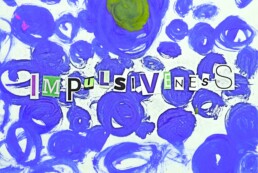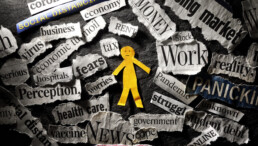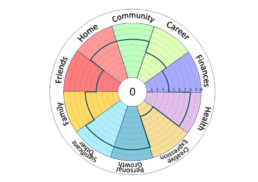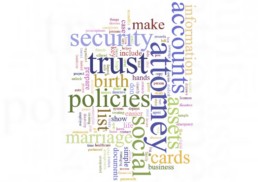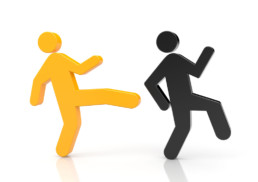Overwhelmed?
Do you ever feel overwhelmed? There’s just too much happening at once. You have bills to pay, appointments to make, places to go, organize your house and maybe your office, assignments due, people to take care of, and so on.
 Or have you ever been in a restaurant full of people talking at other tables, and a musician singing loudly in the background?
Or have you ever been in a restaurant full of people talking at other tables, and a musician singing loudly in the background?
What you might be experiencing is sensory overload. When I’m trying to write a newsletter, and someone is mowing their lawn nearby, and a large truck is rambling up the road, and my husband is trying to talk to me, and the phone is ringing, and my sweater itches…you get the picture—sensory overload.
Overwhelm and overload are both too much.
When overwhelmed, take control of your schedule by deciding what’s important and what can wait.
With overload, if you can cut out distractions – put the phone on silent, put on a comfy sweater – do. A pair of noise-canceling earphones can do wonders with overload.
Life happens, there’s no controlling that. It’s up to you to realize it’s normal and find solutions that work for you.
- Sydney Metrick
Why Fidget?
Are you a fidgeter? Do people tell you to stop fidgeting? Well, don’t listen to them. Fidgeting is good for you, especially if you have ADHD. The H stands for “hyperactivity” and fidgeting falls into that category.
Why is fidgeting good? Well, if you’re feeling overwhelmed it can help calm you. If you’re agitated it’s a way to release energy.
On the other hand, if you’re underwhelmed it can get the dopamine in your brain flowing again. Fidgeting keeps your brain awake.
Whether you’re playing with a squeeze ball or a pen, shaking your leg, or twiddling your fingers, there are many ways people fidget.
Physical fidgeting – tapping your foot, bouncing your leg – can help keep blood flowing when sitting for long periods. While not recommended as a dieting technique, fidgeting also burns more calories than just sitting still.
Because focusing on a specific task generally requires only part of the brain, other parts can get bored. Those parts then get distracted and take your focus with them. For many, doing something small and physical gives focus to the parts of the brain not needed for the task at hand.
As an example, I have one client who is positive that if she had understood how to occupy the non-learning sections of her brain at the time, she would have done much better in college. She frequently fell asleep or “spaced out” because she couldn’t appropriately focus on lectures.
By the way, fidgeting is fine for those who do not have ADHD as well. In the age of online everything, we all find ourselves sitting more and for longer periods than what evolution has built us for.
- Sydney Metrick
Do you have ADHD?
Sometimes I get coaching calls from people who say they’re not sure if they have ADHD.
There are so many different symptoms and at various severities that it can be confusing. Add in all the hype, information, and dis-information, and it is easy to understand why adults who are undiagnosed can feel lost.
Because an ADHD diagnosis depends on having multiple symptoms for multiple years, let me offer some of the common behaviors to look for:
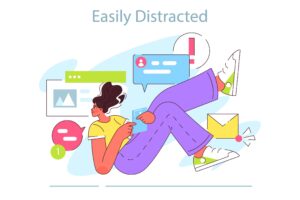 Trouble paying attention, easily distracted
Trouble paying attention, easily distracted- Skipping from one activity to another, not able to persist at an activity for the time required to complete it
- Impulsive behavior
- Restless and fidgety
- Verbally impulsive, blurting out things as they come to mind
- Ideas skipping from one to another
- Don’t always think before acting
ADHD is an executive function disorder. Executive function lives in the frontal lobe of your brain and is your ability to self-regulate and get things done. When executive function is not working correctly, people tend to lose organizational control as well as their ability to properly adapt to situations.
The important thing to keep in mind is that all brain function is chemical. If your brain chemistry is off – due to genetics or environment – there is no permanent solution. However, treatment can provide temporary relief as well as coping mechanisms.
ADHD treatments include medication, therapy/behavior modification, lifestyle changes, or a combination. Figuring out what works best for you is best done with your health care provider.
Personally, coaching helped me. Talking with someone who knows about life with ADHD (not just studied it) kept me from feeling isolated or like I had totally lost my mind.
How Does Impulsivity Show Up in Your Life?
Do you interrupt when others are talking? Are you just skimming this blog? When you see something you like but don’t need, do you buy it anyway? Are you likely to jump out of something you’re doing into something more interesting? Do you act without thinking? Do have impulsive behaviors?
If you have ADHD, some or all of these may feel familiar.
Is there a solution? Not really, sad to say. It’s matter of calming down and asking yourself if you really need to do or say something right at that time. Awareness is key.
 Awareness, however, can be difficult when dealing with impulsive behaviors – that’s sort of the point.
Awareness, however, can be difficult when dealing with impulsive behaviors – that’s sort of the point.
Google “awareness,” “practicing awareness,” or something similar and you will get results from just about every discipline imaginable – from the American Psychological Association to Harvard Business Review. Of all the Tips, Tools, Exercises, and Ways to become self-aware, there are three out there that seems to come up most often:
- Meditate: Find some way to spend some time with just your brain and learn how to slow things down.
- Keep a Daily Journal: Write down all your reactions, impulses, feelings. No judgements, just what happened.
- Ask a Friend: Talk to someone who cares about you and will tell you the absolute truth – whose opinion matters to you. Ask about your strengths and annoying habits.
Just like with any habit, awareness takes time, practice, and patience. Keep at it, though, it’s worth the trip.
-Sydney Metrick
Can You Freeze Time?
Have you ever started to leave the house and remember something you want to do first? It doesn’t matter that you are leaving the house so that you will be on time for your appointment, you just have to get this one thing (or two, or three) done.
For some reason, your brain lets you believe that this 5-minute task will not make you 5 minutes late because time will stop for you. And when the 5 minutes turn into 10, no big deal, time isn’t really passing, right? So, it is really surprising that you end up being late to your appointment.
I am sorry to report that real life has not caught up with science fiction and/or fantasy, time just keeps on ticking away. I have to tell you that “no time at all” is a lie your brain is telling you.
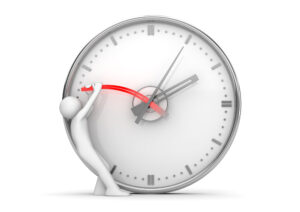 How do you keep track of reality?
How do you keep track of reality?
It helps to have lots of clocks. Have a clock in every room. Analog clocks are more effective as you can see time passing. Look at the clocks frequently. Additionally, for those tasks you only seem to remember at the last minute, write a note. Keep a sticky pad and pen by the door so that you can place the note where you’re sure to see it when you return. Or send yourself a text or voice mail – you can even do that in transit.
Time cushions also help, especially if you include them in your calendar. Cushions give you room for the time an appointment takes that’s not actually appointment time – like travel. I’ve known many people who leave the house when the appointment starts. So, if you need to be somewhere at, say 2 p.m. and travel time in 20 minutes, then the appointment starts (when you leave) at 1:40. I even know a couple of people who have to include the time to get ready (say, getting dressed) in their appointment schedule, otherwise, they wouldn’t get out of bed until the time of their first appointment!
- Sydney Metrick
Tips for people who do or may have ADHD
There are some common “problems” linked to ADHD. However, you can also associate many of these issues with youth, old age, lack of sleep, boredom, lack of interest, anger, excitement, a full schedule, or just a lack of organization. Regardless of the cause, here are some good ways to manage:
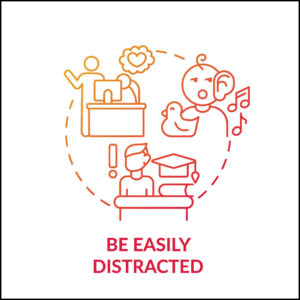 Easily distracted? With each action that calls to you, ask “What is my goal?” If the “distraction” is more relevant than your current action, then decide how you want to follow through with that activity.
Easily distracted? With each action that calls to you, ask “What is my goal?” If the “distraction” is more relevant than your current action, then decide how you want to follow through with that activity.
Interest difficulty? I bet you’re really good at being involved with things you find interesting. Telling yourself something is boring or difficult does not make things better. Instead, look for a way to include one of your values in the activity.
Impulsivity leading to mistakes? Breathe. Research, re-read, and respond instead of just blindly reacting.
Brain pauses? You’re on your way out the door and suddenly remember you haven’t returned a phone call. Time will march on and make you late if you stop and make the call. Write a quick note to yourself and make the call after your current action.
Misplaced items? Think about creating permanent “homes” for things, and make sure to return those things to their homes.
Late assignments? Yes, you need to know when something is due. And, setting start dates for each step can prevent the mad panic of just thinking about a due date.
Procrastinate much? Use the 30 second rule. If something can be done in 30 seconds or less, just do it.
- Sydney Metrick
The Door to Change
“No one can persuade another to change. Each of us guards a gate of change that can only be opened from the inside. We cannot open the gate of another, either by argument or emotional appeal.” (Marilyn Ferguson)
I’d add, nor by teaching or coaching. People don’t change just because it’s a good idea. Change takes commitment and perseverance. I’m guessing you have some behaviors you’d like to change. The thing is, your behaviors are either long-standing habits or they are expressions of a condition like ADHD, and both take a great deal of commitment and perseverance to change.
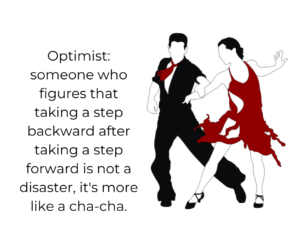 In the book, Mastery, George Leonard says, “learning any new skill involves relatively brief spurts of progress, each of which is followed by a slight decline to a plateau somewhat higher in most cases than that which preceded it.” That’s the fancy way of saying it’s a “two steps forward, one step back” kind of thing.
In the book, Mastery, George Leonard says, “learning any new skill involves relatively brief spurts of progress, each of which is followed by a slight decline to a plateau somewhat higher in most cases than that which preceded it.” That’s the fancy way of saying it’s a “two steps forward, one step back” kind of thing.
Discouragement is likely when change is difficult to notice. It’s easy to drop out at the plateaus. The good news is that our brains have a quality of plasticity. By persisting in developing a new behavior your brain will gradually change and the “new behavior” will become “the standard behavior” in time.
-Sydney Metrick
It's Not You, It's Your Brain
Does the number of thoughts, tasks, and commitments in your life feel overwhelming at times? Even when you know what to do first, do you wonder what to do first?
Do you sometimes worry that you forgot to do something, or how to do the something you remembered?
Have you had trouble meeting deadlines?
Are you sometimes concerned that what you’ve done isn’t good enough or even actually done?
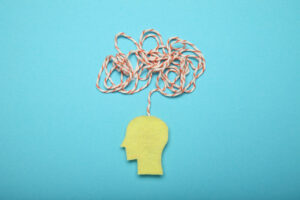 Are your first thoughts about a project more likely the “worse-case scenario” than “yeah, I’ve got this.”
Are your first thoughts about a project more likely the “worse-case scenario” than “yeah, I’ve got this.”
If your answer to any of these questions is yes, you likely have worries. All these demands and your thoughts about them can lead to anxiety. Now for those of you with ADHD, anxiety is likely to be present along with your other symptoms. You might feel stressed more easily, have sleep issues, find it difficult to get things done, and even find your self-esteem is impacted.
Worry anxiety on top of ADHD anxiety is no fun.
The not so good news is that anxiety can be disabling. The better news is two-fold. First, when things feel overwhelming, you can break projects and tasks down into small steps and use the steps to design your day (get help if you can’t seem to do it yourself). Second, it is OK to let go of “should,” perfection, and comparisons to others; better than OK, it’s healthy.
Just keep in mind, it’s not you, it’s your brain. The anxiety may be due to the difference in function of two neurotransmitters, dopamine and norepinephrine. Awareness and developing tricks, tools, and habits can reduce anxiety.
- Sydney Metrick
What Not to Expect
Does this ever happen to you? You compare your work, or your looks, or your accomplishments to someone else’s and feel they are in a “better” place than you are?
There are two problems inherent in this kind of thinking. One is that since you are unique you have your own path to travel. Where your path has many curves, whoever you compare yourself to may be in a straight segment of theirs. Someday the opposite may be true.
The other related problem is having expectations. These typically have the word “should” involved. For example, thinking you should be able to maintain a schedule, or you should be able to estimate how long a task will take, or you should have remembered a task or appointment you’d committed to.
 I’m not a fan of should. When you think shouldn’t have done something you criticize yourself. When you think you should, but aren’t likely to, you’re putting pressure on yourself. It’s a guilt word. In the first case, if you didn’t do something you’d planned to do, look at why and what the solution might be. In the second case, either A) do what you intend, or B) realize you aren’t going to do it and that’s okay for the time being.
I’m not a fan of should. When you think shouldn’t have done something you criticize yourself. When you think you should, but aren’t likely to, you’re putting pressure on yourself. It’s a guilt word. In the first case, if you didn’t do something you’d planned to do, look at why and what the solution might be. In the second case, either A) do what you intend, or B) realize you aren’t going to do it and that’s okay for the time being.
Expectations lead to disappointment. If, by chance, you have ADHD you are likely to have problems with executive functions such as sustaining attention, planning, organizing, remembering details, managing time, or staying on task.
It might take you longer to start and longer to finish a task or project. You might get distracted by things outside or by your own thoughts. As a result, you might often feel overwhelmed which can lead to anxiety or depression.
So, if you do have an attention difference, take the time to find your own style and get comfortable with it. You will be more productive in the long run. Expecting that you’ll be like anyone else, well…
Finding your own style is important. Imagine how much easier life would be if you know how to manage your schedule, estimate the time a task will take, and remember your appointments. Helping people do this is what puts the heart into coaching.
-Sydney Metrick
What is Your “Too Much”?
Do you find it hard to think when you’re in a noisy environment? Do certain fabrics against your skin, or labels in your shirt drive you up the wall? Can the smell of someone’s cologne or aftershave make you want to leave the room?
When people think of ADHD and filters, they tend to consider only the filters that keep inappropriate things from coming out of our mouths. Rarely do they consider filtering inputs, or our inability to filter inputs.
 ADHD or not, for those of us lacking good filters, sensory experiences - be they seeing, hearing, touch, smell or taste - are sometimes difficult to bear. In fact, having a label in your shirt that rubs against your neck might be so distracting that it’s all you can focus on. The proximity and number of people in a crowd might feel really uncomfortable.
ADHD or not, for those of us lacking good filters, sensory experiences - be they seeing, hearing, touch, smell or taste - are sometimes difficult to bear. In fact, having a label in your shirt that rubs against your neck might be so distracting that it’s all you can focus on. The proximity and number of people in a crowd might feel really uncomfortable.
Not everyone can tune out distractions in whatever form they might be presented. Not being able to filter input or create boundaries leads to overstimulation. That’s one reason why most of the people I’ve worked with describe themselves as overwhelmed.
While you may not be able to create filters, you can develop boundaries. In loud or crowded environments find a quiet corner, or give yourself permission to leave when you feel anxious. At home or work limit noise. Use earplugs or headphones when you can. Cut those itchy labels out of your clothes and wear fabrics you enjoy—typically natural fibers feel better. Buy fragrance-free products.
Finally, take a break. If you need alone time or quiet periods during the day, schedule them in.
ADHD Myths and Facts

MYTH: ADD/ADHD is just a lack of willpower. Persons with ADD/ADHD focus well on things that interest them; they could focus on any other tasks if they really wanted to.
FACT: ADD/ADHD looks very much like a willpower problem, but it isn’t. It’s essentially a chemical problem in the management systems of the brain.
MYTH: Everybody has the symptoms of ADD/ADHD, and anyone with adequate intelligence can overcome these difficulties.
FACT: ADD/ADHD affects persons of all levels of intelligence. And although everyone sometimes has symptoms of ADD/ADHD, only those with chronic impairments from these symptoms warrant an ADD/ADHD diagnosis.
MYTH: Someone can’t have ADD/ADHD and also have depression, anxiety, or other psychiatric problems.
FACT: A person with ADD/ADHD is six times more likely to have another psychiatric or learning disorder than most other people. ADD/ADHD usually overlaps with other disorders.
MYTH: Unless you have been diagnosed with ADD/ADHD as a child, you can’t have it as an adult.
FACT: Many adults struggle all their lives with unrecognized ADD/ADHD impairments. They haven’t received help because they assumed that their chronic difficulties, like depression or anxiety, were caused by other impairments that did not respond to usual treatment.
Source: Dr. Thomas E. Brown, Attention Deficit Disorder: The Unfocused Mind in Children and Adults
How Does Your Wheel Roll?
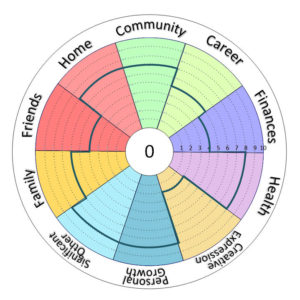 Life balance. What does that even mean? Can you have a balanced life? If so, how?
Life balance. What does that even mean? Can you have a balanced life? If so, how?
First, how’s your life at the moment? There are several assessments to see if you are in or out of balance. Many coaches use a tool called the “Wheel of Life” for this.
Most of us express our thoughts, time, and energy in eight to ten different areas. The “Wheel of Life” gives you a way to rate your life in each of these areas. Personally, I use the following categories with my clients:

- Friends
- Personal Growth
- Family
- Community
- Health
- Career
- Home
- Finances
- Significant Other
- Creative Expression
Feel free to substitute school for career, or whatever other changes will accurately reflect the key components of your life. Once you have your categories, assess your current level of satisfaction in each area on a scale of 1-10. Your consideration is based on what that category means to you. For example, in the Significant Other category: you have a significant other and it’s a good relationship, so you give yourself a 9; or, you don’t have a partner and don’t want one, that can also be a 9. But if you’re not happy with your relationship, perhaps you give yourself a 3 or 4.
 This person is fairly pleased with their relationships with their home, community, health, significant other and personal growth. They are not satisfied with the relationships they have with friends, career and, finances, which indicates they would benefit from setting goals, deciding what is realistic. Family is another area they may wish to address.
This person is fairly pleased with their relationships with their home, community, health, significant other and personal growth. They are not satisfied with the relationships they have with friends, career and, finances, which indicates they would benefit from setting goals, deciding what is realistic. Family is another area they may wish to address.
Once you have all your numbers you can see if you’re balanced, such as all numbers fall between 7 and 9, or all between 4 and 7. Both ranges show balance, but only that first range shows satisfaction. Any area that indicates a satisfaction level of five or less would benefit from attention to bring it up. This means setting goals, creating plans to achieve them, scheduling and fulfilling action steps.
Do not expect to maintain balance once you reach it. Life has a way of changing and you can get out of balance without noticing. Personally, I re-do my wheel at the turn of every season.
-Sydney Metrick
And now for something completely different- and yet very relevant
I recently had a convergence of “Tales from Mexico” – a section of my newsletter – and something I would do an article on.
First, the Tale from Mexico: I got accepted to a group health insurance plan that included an in-person orientation. The discussion included conversation and forms on being prepared for life and death lakeside. (That’s where I live; around Lake Chapala.) That gave me the nudge I needed to talk with a local company about cremation services and make an appointment to get a will drawn up.
The same week I received the latest Notes from the Junk Drawer telling me all about the important documents I needed to have readily available in a “just in case” situation. Not a fun topic, true, yet one that is best faced when you are not in the middle of a crisis.
Just some of these documents include: Social Security card, birth certificate, marriage certificate, will and/or trust documents, banking information, attorney contact information, and insurance policies.
I strongly suggest you check out the article and spend a few minutes putting all those things in one place – and let your loved ones know where that place is.
-Sydney Metrick
Is paying attention working for you?
Does this ever happen to you? You have a great idea in the shower or while driving but completely forget about it before you can act on it. You put something in a place where you’re sure it will be safe and then forget where that place is. Despite putting it in your calendar, you forget an appointment or show up on the wrong date or time.
 These things happen to everyone from time to time, but with greater frequency, if you happen to have attention deficit disorder. Regardless, there are ways to improve your results.
These things happen to everyone from time to time, but with greater frequency, if you happen to have attention deficit disorder. Regardless, there are ways to improve your results.
Depending on the situation, having a notepad and pen so you can jot down ideas as soon as possible is a good idea. When I was teaching, a thought would pop up while I was talking about something else and I’d quickly note it on a pad for later. You can also capture thoughts with your phone. (Obviously, neither of these will work while you’re actually in the shower. And, please, don’t write and drive.)
On more than one occasion I’ve put money in safe places that my memory refused to recall. Rather than continuing to lose money and other valuables, I have created three places that I use as various safe spots – and only those three places.
The calendar is your friend. Use if for planning and as your memory. This is an amazing memory tool – just as long as you check it with frequency. At the end of the week, take a look at the coming week to get your bearings. Things change constantly, so check every evening, every morning and even though out the day. Just because you looked at the calendar in the morning doesn’t mean you will remember you have a 4:30 p.m. appointment.
Here’s a bonus tip: Some of you may recall the 30-second rule. If it takes 30 seconds or less for a task, it makes sense to just do it. That could be washing your coffee cup, putting your shoes away, or checking your calendar!
-Sydney Metrick
A "Kick in the Butt"
On a scale of 0 to 100, what percentage of what you say you want to “do,” “have,” or “be” actually comes to fruition? There is a big difference between saying what you want for yourself and taking the steps to make that your reality.
“The secret of success without hard work is … still a secret,” says Ivan Misner, founder of the world’s largest business networking organization, BNI.
As far as I know, fairy godmothers, genies, and elves exist only in fairy tales, so your successes are only to come about with commitment and efforts. That commitment and those efforts are stronger when you can clearly define your intentions and goals. Writing can help you crystallize your thinking:
- First, write down a specific goal you wish to achieve. Let’s say you want to be able to hold a simple conversation in Spanish by the end of the year.
- Second, what steps will you take to reach that goal? So, spend 30 minutes a day studying Spanish.
- Third, add what’s in it for you to achieve that goal. You won’t (overly) embarrass yourself when you are in Spain for business next year.
- Finally, what would your life be like and how would you feel if you “flaked.” Like an idiot in front of your colleagues.
 This is a good start, but to increase your likelihood of success, share goals and intentions with others. Let people around you know what you’ll be doing. The best person to tell is one that will hold you accountable. This is what a coach does. A coach helps you clearly define what you want, break the goal into manageable action steps, encourages you to calendar the steps and then, regularly checks in with you to see how it went and make any adjustments to the process.
This is a good start, but to increase your likelihood of success, share goals and intentions with others. Let people around you know what you’ll be doing. The best person to tell is one that will hold you accountable. This is what a coach does. A coach helps you clearly define what you want, break the goal into manageable action steps, encourages you to calendar the steps and then, regularly checks in with you to see how it went and make any adjustments to the process.
As a coach, I always ask clients to design how they like me to interact with them. Much of the time the answer is, “give me a kick in the butt.” That is so much easier when I know what I’m kicking you towards.
-Sydney Metrick
Re-Evaluating
What opportunities will you open up to in 2018?
This past Fall we said goodbye to California and moved to Mexico. Oh, and got married, too. For a person like myself with ADHD, the amount of details was overwhelming. Ordinarily, I would have said there is no way I could manage all the research involved with selling most of our possessions and our house, getting visas, planning a drive, and all the other details.
Yet, I did it.
We had decided to make this move a while ago, and now was the time. I gave up what I thought I was capable of and did what I needed to make the decision a reality.
Mexico is wonderful. But it is very different from California. Plus, we had to discover places to shop, eat, get things fixed. We needed to find doctors, dentists, lawyers, and friends. Think all that was challenging? Really, not so much. I know I am more capable than I thought I was. I can do without some of the things I thought were necessary (like Trader Joe’s), and I can learn just about any new thing with time and practice.
Perhaps you are holding some limiting stories about your capabilities and options based on your past or other people’s opinions.
The new year is a good time to re-evaluate your life. What from 2017 do you want to let go of? What will you develop further?
And the day came when the risk to remain tight in a bud was more painful than the risk it took to blossom.
– Anaïs Nin
– Sydney Metrick




